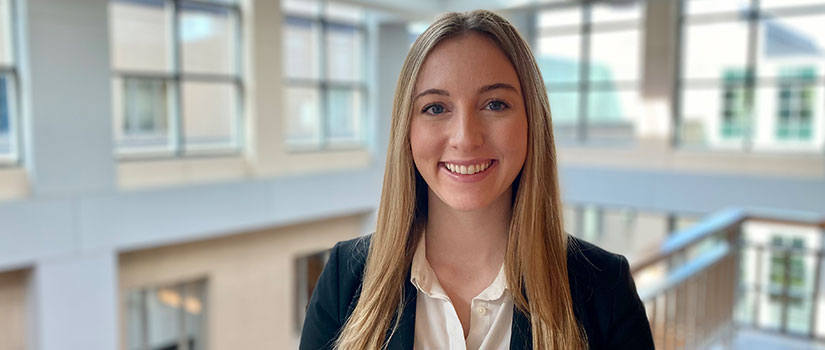Erin Brown is headed to Capitol Hill.
Starting in the summer of 2024, the University of South Carolina graduate will serve as a law clerk for the Supreme Court. In that role, she will work on hundreds of petitions, hearings and decisions handled by the highest court in the country.
“The kinds of issues that reach the Supreme Court are often those that have divided many judges and courts below, so they’re truly some of the toughest and highest stakes issues,” Brown says.
Brown is ready for the high-stakes job because she’s prepared for years. She has clerked for two federal courts already in addition to obtaining a law degree.
But even before these experiences, her time at USC set her on the path to Washington, D.C.
Brown earned degrees in political science and economics. She says the variety of courses she took in the SC Honors College and the College of Arts and Sciences prepared her for law school by helping her learn to think critically using different analytical approaches.
She also participated in student government during all four years at USC. That experience ultimately helped her decide to pursue a law degree by showing her where she thrived.
“Student Government was a very formative experience,” Brown says. “I realized I loved the practical, day-to-day work of taking on issues and working with others to accomplish our goals.”
Her senior year, Brown served as the elections commissioner, and this role helped her build skills she now uses every day at work in the justice system.
“I was enforcing rules and regulations, sometimes having to make a decision that was not the popular choice, like disciplining candidates for breaking the rules,” she says.
“That involved explaining the reasoning behind my decisions and essentially establishing precedent to guide candidates in the future, which resembles my work as a law clerk.”
 During her Washington Semester as an undergraduate, Erin Brown learned to navigate
the Hill and gained valuable experiences that prepared her for law school and set
her on a path to a career in Washington, D.C.
During her Washington Semester as an undergraduate, Erin Brown learned to navigate
the Hill and gained valuable experiences that prepared her for law school and set
her on a path to a career in Washington, D.C.
Students in any field of study can participate in the Washington Semester program, offered by the SC Honors College. Learn more about how to get involved.
Finding a home on the Hill
Another influence in Brown’s decision to become a lawyer was the Washington Semester program, which gave her a semester to live and intern in D.C., with a slate of classes focused on the nation’s capital.
“That was absolutely an amazing experience,” Brown says. “We lived right on Capitol Hill, behind the Supreme Court building.”
Brown interned for a South Carolina congressional representative, working hands on with his staff and taking classes in the evening on political science as well a theater course that took her to performances throughout the city.
The semester in D.C. gave Brown a chance to see herself at work on Capitol Hill and helped to make her path clear.
“It solidified my interest in going to law school because I was able to see lawyers contribute in important ways to the legislative process,” she says.
“I could imagine myself working as a lawyer in Congress one day.”
Since graduating from the University of Virginia School of Law in 2021, Brown has clerked for Judge Carl Nichols (U.S. District Court for D.C.) and Judge Britt Grant (U.S. Court of Appeals for the 11th Circuit).
While the responsibilities of each clerkship differ, Brown says working as a law clerk helps her learn more about the U.S. legal system and sharpens her skills as a lawyer.
“Any clerkship where you’re helping the judge draft opinions and work through difficult legal issues is going to make you a better writer and also a better lawyer,” Brown says.
In her upcoming clerkship, Brown will serve in the chambers of Justice Brett Kavanaugh. She will work with a team to sort through cases the Supreme Court is considering and, among other tasks, assist the justice in deciding cases based on careful study of the law.
“Contributing to reaching the right answer in those cases is one of the things I look forward to most about the job,” Brown says. “But that will only be one part of my role. So many elements of the job are just about working hard with your team.”
